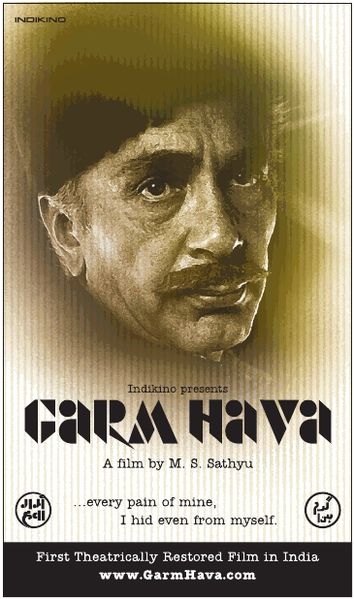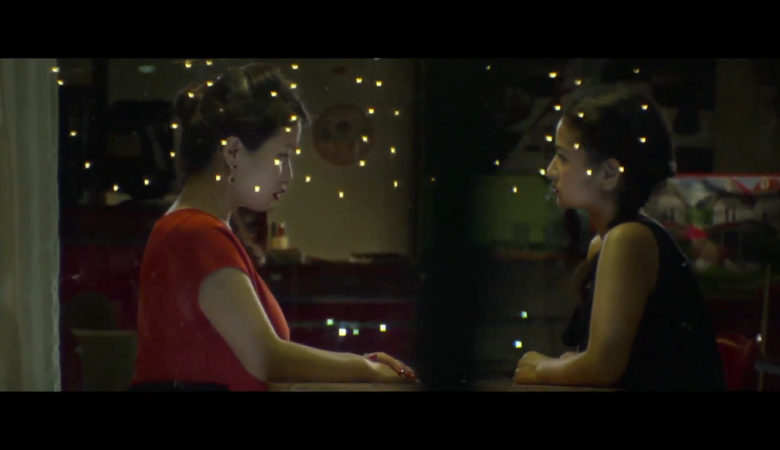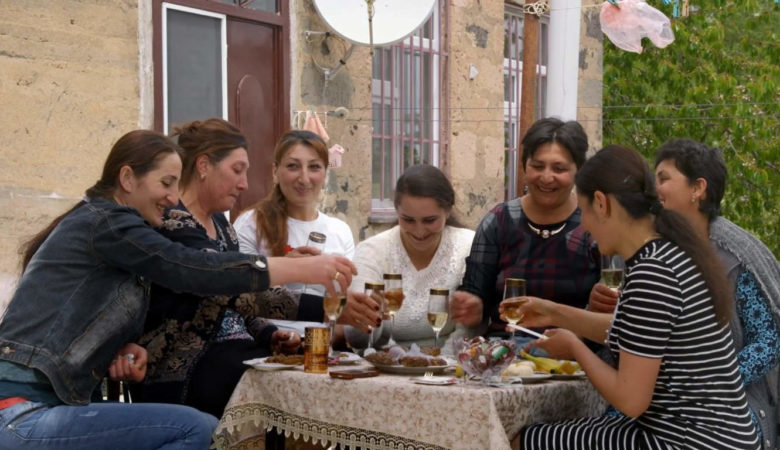Review by Vinoo
Language : Urdu / Hindi
Director : M S Sathyu
‘Garam hawa’ definitively the best film on partition and right on top of the best films from our country. During partition many Muslims in India decided to stay back in India. Well… why should they leave a country that was as much theirs as anyone else’s. And of course many Hindus in Pakistan stayed back in Pakistan for the very same reason. Mirza Salim (Balraj Sahni) is one of them, who for generations has been in the leather business. He decides to stay on, with family, in India. Salim’s brother Halim leaves with his wife and son, to Pakistan with the belief that things are better there for a muslim. Halim promises that Kazim will be back to marry Salim’s daughter, Amina (a beautiful Gita Siddharth). Salim, with his family, is forced to move to a smaller house after he is forced to evacuate his house that is in his brother Halim’s name. Meanwhile Kazim sneaks into the country to get married to Amina and while a quick marriage is being planned the police get wind of it and arrest Kazim. Salim’s sister’s son, Shamshad (Jalal Agha), takes a liking for Amina. Very apt Qawwali from the film, a prayer to Maula Saleem Chhisti asking for her desire to be fulfilled. Here is the link to the fab Qawwali
[ftii]9ilOntNHFhY[/ftii]
They are all but married but all of a sudden Shamshad has to leave for Pakistan with his family. Later Amina gets to know that Shamshad is getting married in Pakistan and she cannot cope with it a second time over and she commits suicide. Salim is shattered and to add to his woes a minor accident on way to his factory ends up in a minor communal riot as is the case in our country even to this day. Any excuse to settle personal scores and most often religion is easy bait. Salim is arrested and then released for want of evidence. Salim’s son, Sikander (Farooque Sheikh in his debut), is well educated but fails to find a job. Salim is branded a Paki spy and is insulted time and again. Finally he can take it no more and more or less decides to migrate. It is at this time that a procession of young people is on a protest march demanding food, education, jobs and equal rights. Sikander refuses to give up meekly and joins the procession. Salim has not much choice but to respect the choice his son has made and he himself becomes a reluctant participant in the procession. Like he says ‘Muslims in India have only two options. Either go to Pakistan, or join the Congress’. Is there hope at the end of it all? The film ends with a quote, written and narrated by Kaifi Azmi. ‘Jo duur se karte hai toofan ka nazara, unke liye toofan vahan bhi hai yahan bhi, dhaare mein jo mil jaoge ban jaoge dhara, yeh waqt ka ailaan vahan bhi hai yahan bhi’. The last scene with subtitles to explain the above
[ftii]4uE_MHGibGE[/ftii]
The narration in the end reminded me of Kaifi Azmi’s brilliant ‘Kaifiyat’.
Hats off to M S Sathyu for this wonderful film. The success of the film lies in the fact that he makes you and me empathize with Salim and his family. And not once in the entire length of the film do you feel that it is about a specific religion or about somebody else. It could be the plight of any family in a situation like this. Sathyu exposes the dirty politics played on either side of the border. I am told there is a Pakistani film ‘Kartar Singh’ on a similar subject. Hope to access that one too. Brilliant performances by the entire cast and brilliant adaptation of Ismat Chughtai’s script by Kaifi Azmi and Shama Zaidi. Kaifi Azmi changed Ismat Chughtai’s original script in which Salim was a Station Master. Kaifi brought in his experiences as a union leader and his experience with the left movement and wrote in the Salim character as a leather merchant.
CFD and Suchitra with movieshoovie.com did well to screen ‘Garam Hawa’ on Republic Day and it was a privilege to be able to watch it with the Director of the film, M S Sathyu. Another Sathyu favourite of mine is ‘Bara’ (Famine) which I thought was simply superb. M S Sathyu mentioned post the film that the Left movement and many other important freedom movements have not been given its due in our history. It has been hijacked by the Congress like it is their personal property. He also spoke about how Gandhi could have got Bhagat Singh a pardon but chose not to. Another instance he mentioned was how Subhas Chandra Bose’ role in the freedom movement is not acknowledged and he is still seen as a traitor by the Indian Army. Well… all I will say is ‘We have been taught a wrong history’.
Watched ‘127 hours’ and came away unimpressed, except for the fact that it is a true story. I’d much rather read the book. The ‘Hollywoodised’ extra-super-cool dialogues ‘Next time don’t buy Chinese’ when Aaron is chopping off his left arm with a blunt knife kind of ruins it for you. Also don’t know what’s all the noise about the film’s music. Finally got to watch this bullshit called ‘Paranormal activity’. James Randi will agree with me on that J. Someone trying to concoct a scare with a bit of air and suddenly closing doors, Television sets and lights switching on and off on their own not really my idea of a horror flick. Yeah, I did read about the budget it was made with and the collections. It’s sad I contributed to it too.
Like someone said ‘I stopped jumping into the sea after I watched Jaws’. That, to me, is horror.
Useless trivia : Most of the actors in ‘Garam hawa’ were stage actors from Indian People’s Theatre Association, IPTA. Badar Begum who plays Salim’s mother was apparently discovered in the locality where the film was shot. One of my favourite scenes in the film is where she is hiding in the fireplace as she doesn’t want to leave the old haveli where she has spent all her life. The scene almost sums up the film.
‘Garam hawa’ was India’s official entry to the Academy Awards in the Best Foreign Language Film section in 1974.









Leave a Reply